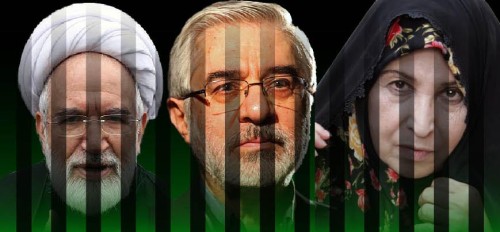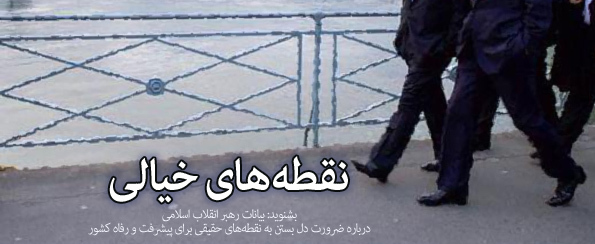In a small shift on the four-year house arrests of opposition leaders, Iran’s regime is reportedly reviewing the position in the next fortnight.
Saham News said the Supreme National Security Council will look at the cases of Mir Hossein Mousavi and Mehdi Karroubi — both candidates in the disputed 2009 Presidential election “won” by Mahmoud Ahmadinejad — and Mousavi’s wife, the academic, activist, and artist Zahra Rahnavard. The three were shut in their houses on February 11, 2011, as the regime feared the renewal of mass protests.
Saham News, linked to Karroubi, said that President Rohani had asked the SNSC head, Ali Shamkhani, to review all available documents and evidence.
Rouhani pledged in his 2013 Presidential campaign to free political prisoners, but he has been checked by hardliners who have said that leaders of “sedition” — their phrase for the mass protests — cannot be freed. The Supreme Leader said last autumn that Mousavi and Karroubi should be grateful for their confinement, as they would suffer far more if they were put on trial and convicted.
The reformist Association of Combatant Clerics, in a statement for next week’s anniversary of the 1979 Islamic Revolution, asked Rouhani to renew the attempt to get the support of the Supreme Leader.
Hardliners are already hitting back at any attempt to review the cases. Ayatollah Ahmad Jannati, the head of the Guardian Council, repeated the line that those who want to lift the house arrest “just want to cause sedition”. He snapped,“If some jerks are talking about this issue, does it mean this is the request of 75 million Iranians?”
Claims are also circulating that the review has been undermined: all the documents relating to the house arrests have been taken out of the Supreme leader’s office.
Family of Detained Washington Post’s Rezaian Criticize Government After Hard-Line Judge Named for Trial
The family of Jason Rezaian, the detained Tehran correspondent of the Washington Post, issued a statement Sunday that was sharply critical of the Iranian government.
The family of Rezaian, imprisoned for more than six months, protested the “very disturbing” development that Rezaian and his wife Yeganeh Salehi will be tried by Judge Abolghassem Salavati, known for his harsh sentences.
“We find it very disturbing that the judiciary would select a judge to oversee the case who has been sanctioned by (and barred from entering) the European Union due to what it calls ‘gross human rights violations’,” the family said.
Salavati was cited by the EU in 2011.
Rezaian and Salehi were seized on July 22 along with two other journalists. Only Rezaian is currently behind bars, with Salehi bailed in October.
The Washington Post correspondent has been unable to see a lawyer and the charges against him are unclear.
Parliament: If US Congress Adds Sanctions, We Scrap Interim Agreement and Speed Up Nuclear Program
At least 220 of Iran’s 290 MPs have signed a bill ordering the Government to speed up nuclear activities if the US Congress imposes further sanctions on Tehran.
“The bill requires the Government to annul the Geneva Interim agreement [signed between Iran and the 5+1 Powers in November 2013] and resume all its nuclear activities in case of intensified US sanctions,” the chairman of Parliament’s Nuclear Committee, Ebrahim Karkhaneyee, said Monday.
The bill will be submitted to Parliament’s Presiding Board this week.
Rouhani Uses Internet (and Legs of Zarif and Kerry) to Claim Supreme Leader’s Continued Support of Nuclear Talks
Trying to maintain support for the nuclear talks with the 5+1 Powers, despite a lack of visible progress towards a comprehensive agreement, President Rouhani has used the Internet to invoke the continued backing of the Supreme Leader.
Over the weekend, Ayatollah Khamenei’s website used a photo of the legs of Iranian Foreign Minister Mohammad Javad Zarif and US Secretary of State John Kerry — cropped from a full-length picture of the two men as they walked through Geneva in the midst of seven hours of talks last month — to highlight the Supreme Leader’s speech:
I’m not against the talks. Negotiate, and negotiate until whenever you want. I believe we should place hope in the promising points, not the fantasy points.
Rouhani’s office used the same photo on Instagram to illustrate his Saturday speech challenging the criticism of hardliners of the nuclear discussions:
Today, we have very experienced diplomats who negotiate with the world’s six powerful countries about legal, political and technical issues. This is a source of pride for our country.
See Iran Daily, Feb 1: Rouhani Stares Down Critics of Nuclear Talks


